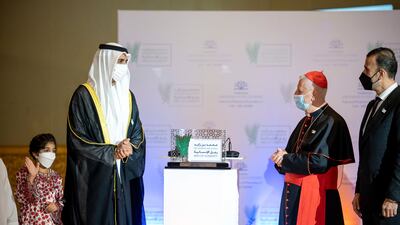In the early days of his papacy, Pope Francis called on Catholics around the world to leave the cloisters and go out into the world to serve people in the "peripheries". It was a bold attempt to warn against the excessive introspection into which grand institutions such as the Catholic Church can occasionally fall.
Pope Francis's defining maxim, already demanding, became much more so when the world was suddenly cloistered by Covid-19. For governments, whose foremost responsibility remains crisis management at home, it has been even more complex. Rather than continue vital aid programmes to help those in need abroad, some donor countries have cut budgets.
Others have not. Yesterday, Sheikh Mohamed bin Zayed, Crown Prince of Abu Dhabi and Deputy Supreme Commander of the Armed Forces, was awarded the Man of Humanity award by the Foundation Gravissimum Educationis, a Vatican organisation that promotes education as a primary means of furthering peace and development. The award was given in recognition of the UAE's ongoing international aid efforts and in appreciation of Sheikh Mohamed’s role in promoting universal values.
Over the past year, the UAE has supplied aid to a total of 135 countries in peripheries across the globe. In May, Emirates airline transported 100 tonnes of materials to help India in its fight against coronavirus, including tents to shelter patients as hospitals overflowed and canisters of oxygen as supplies ran dangerously low. Last summer, in collaboration with the Vatican Department of Education, the UAE sent 40 tonnes of aid to the Amazon region.

This particular shipment is indicative of another, longer-term focus of the global aid community: repairing the damage done to children's education across the globe, in countries both rich and poor. Unesco estimates that Covid-19 at one point partially or fully closed half of the world's schools. It also estimates that 100 million children will fall below minimum literacy standards, a threat not just to the personal progress of young people but to the prosperity of entire countries. Sheikh Mohamed has overseen philanthropic work in a number of similar areas, from education to public health initiatives that focus on the elimination of polio and malaria.
Plotting the path forward for international development in a post-pandemic era is not easy. Deepening existing friendships and alliances helps. The growing partnership between the UAE and the Vatican has now been underway for a numbers of years, as both countries pursue the wider goal of boosting religious and societal tolerance. In February 2019, they made history with Pope Francis's visit to the UAE, the first papal trip to the Arabian Peninsula in history, to sign the “document on human fraternity for world peace and living together”, alongside the Grand Imam of Egypt's Al Azhar mosque.
Yesterday's news of this latest step in the UAE-Vatican relationship strengthens the new bond between one of the world's youngest and fastest-developing countries and one the world's oldest and smallest. They might seem a unique, perhaps even an unlikely duo, but they are helping to develop a growing consensus around the world on the need for leadership even – and especially – when a challenge as great as this pandemic tempts countries to look only inward.


